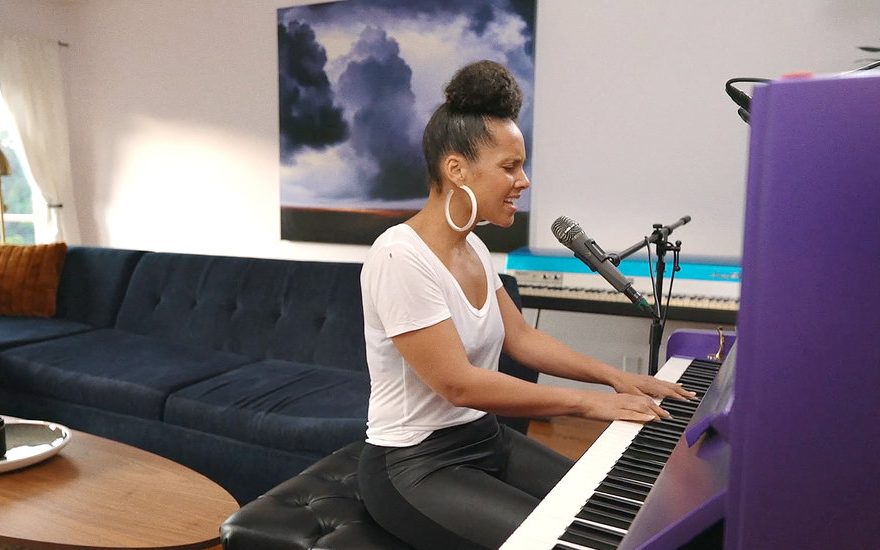Alicia Keys, Mariah Carey, Billie Eilish, Camila Cabello and Sam Smith performed remotely to raise money for organizations helping with Covid-19 relief.
By Jon Pareles
The “iHeart Living Room Concert for America,” broadcast Sunday night on Fox TV and the iHeartRadio network, was a downsized, deglamorized pop gala. With the coronavirus pandemic keeping Americans at home, the night that had originally been scheduled for the iHeartRadio Music Awards, now postponed, instead became a benefit show for the food-bank charity Feeding America and the First Responders Children’s Foundation.
Between songs, video clips paid tribute to front-line workers: doctors, nurses, police officers and firefighters, truck drivers, grocery restockers, people frantically working to alleviate shortages of personal protective equipment. Elton John, the host of the hourlong show, called for donations as he introduced the performers. He also pointedly connected the pandemic to a previous one: H.I.V./AIDS.
The stars wore hoodies, T-shirts, even pajama bottoms (that would be Brian Littrell of Backstreet Boys). Instead of sharing a big stage, they played on living-room couches or in home studios. Most of the show business and studio embellishments were stripped away for solo performances: songwriters alone with their guitars or keyboards, occasionally joined electronically by bandmates performing from their own isolated spaces. Whether the performances were actually live was debatable; some visuals were clearly edited. (And somehow, even solo-at-home segments often featured multiple camera angles.)
But rough spots in the music weren’t tweaked. It was understated proof that even as contemporary pop productions are relentlessly computer-processed, there are real singers behind them.
A few of the performers had songs to suit the moment: Alicia Keys sang her new “Underdog” fondly from her piano as she praised “people on the front lines knowing they don’t get to run.” Dave Grohl earnestly belted “My Hero” with an acoustic guitar, then suggested its chorus as a hand-washing song. Green Day’s “Boulevard of Broken Dreams,” performed solo by a gum-chewing Billie Joe Armstrong, had a refrain made for social distancing: “I walk alone.” Demi Lovato emoted through part of her “Skyscraper,” about the aftermath of devastation.
Others relied on less thematic hits. Backstreet Boys electronically synced up to share “I Want It That Way” over a studio backup track. Billie Eilish, with her brother Finneas on guitar, sang “Bad Guy” behind half-closed eyes, delivering each breathy phrase with deceptive nonchalance. A barefoot Camila Cabello, with her boyfriend Shawn Mendes on guitar, sang “My Oh My” with lavish melismas and consulted her phone to recall lyrics that had been rapped by DaBaby. Sam Smith performed “How Do You Sleep?” without the elaborate electronic counterpoint of its studio recording; instead, he sang it a cappella, snapping his fingers.
Tim McGraw straddled the diving board of his swimming pool while he sang “Something Like That,” with studio musicians joining him remotely. Mariah Carey had backup too: a keyboardist and three singers filled out “Always Be My Baby,” which peaked with a high-note flourish. Meanwhile, without fanfare, H.E.R. unveiled a brand-new song: a plea for reconciliation with a lover called “Keep Holding On.”
Seeing performers broadcasting from their homes offered not only a glimpse of personal spaces (and dogs) but of music in rudimentary form — without a band to punch it up, a studio realization to build its superstructure, a show to flesh it out. That kind of bare-bones intimacy has its charms, but also its limitations; there’s synergy in musicians striving together and using every tool and toy at their disposal. (Lady Gaga and Lizzo, both big-room troupers, appeared on the show to talk but not to sing.)
The songs weren’t larger than life; they were room-size, or just screen-size. For all the sincere, we’re-all-in-this-together sentiments that were offered during the broadcast, this “living room concert” was also a clear reminder of our enforced state of isolation.
Source: Read Full Article


